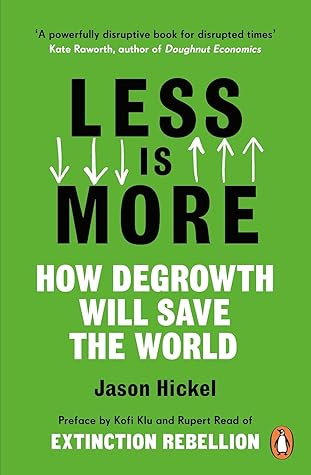More on this book
Community
Kindle Notes & Highlights
by
Jason Hickel
Read between
August 23 - August 28, 2021
XR is the smoke-alarm.
This book offers hope by showing that the kind of demands that XR has put forward are achieveable.
what we need to do to survive is the same as what we need to do to have better lives.
‘GDP-growth is an index of the welfare of capitalism, not of the welfare of humans’,
‘If we lose the insects then everything is going to collapse.’1
UN scientists have found that 40% of the planet’s soils are now seriously degraded.
aggressive overfishing: just as with agriculture,
gut. We are sleepwalking into a mass extinction event – the sixth in our planet’s history, and the first to be caused by human economic activity.
every degree we heat the planet, the yields of staple cereal crops will decline by 10%.
What makes capitalism different from most other economic systems in history is that it’s organised around the imperative of constant expansion, or ‘growth’:
All living organisms grow. But in nature there is a self-limiting logic to growth: organisms grow to a point of maturity, and then maintain a state of healthy equilibrium. When growth fails to stop – when cells keep replicating just for the sake of it – it’s because of a coding error, like what happens with cancer. This kind of growth quickly becomes deadly.
low-income countries, and indeed most countries in the global South, remain well within their fair share of planetary boundaries. In fact, in many cases they need to increase energy and resource use in order to meet human needs.
High-income nations, given their greater responsibility for historical emissions,
Because more growth means more energy demand, and more energy demand makes it all the more difficult
Clean energy might help deal with emissions, but it does nothing to reverse deforestation, overfishing, soil depletion and mass extinction. A growth-obsessed economy powered by clean energy will still tip us into ecological disaster.
that it is easier to imagine the end of the world than to imagine the end of capitalism.
Capitalism is so taken for granted that its proponents don’t even know how to justify it.
77%. In 2020, a survey by the Edelman Trust Barometer showed that a majority of people around the world (56%) agree with the statement, ‘Capitalism does more harm than good’.
over-consumption is putting our planet and society at risk,
it’s not growth that matters; it’s how income and resources are distributed.
the only feasible way to reverse ecological breakdown and keep global warming under 1.5°C, or even 2°C, is for high-income countries to actively slow down the mad pace of extraction, production and waste.
‘degrowth’ – a planned reduction of excess energy and resource use to bring the economy back into balance with the living world in a safe, just and equitable way.
will we ignore science in order to maintain our world view, or will we change our world view?
Sometimes new ideas can make you see everything differently.
Capitalism rose on the back of organised violence, mass impoverishment, and the systematic destruction of self-sufficient subsistence economies.
The scarcer something is, the more money you can extort from people who need it. For instance, if you enclose an abundant resource like water and establish a monopoly over it, you can charge people to access it and therefore increase your private riches.
Life was organised around the principles of sufficiency and desire: people would work as much as they needed, and the rest of the time they spent dancing, telling stories, drinking beer … having fun.
in order to enslave someone, you first have to deny their humanity.
Nothing really exists until it has been realised by humans, constituted in human language, given names and meaning, and inserted into our symbolic world.
restaurant. Amazon’s profits don’t just go to putting food on the table for Jeff Bezos – they go into expanding the company: buying up competitors, putting local shops out of business, breaking into new countries, building more distribution centres, pumping out marketing campaigns to get people to buy stuff they don’t need, all to extract more profit each year than the year before.
no one can be satisfied with a steady-state approach; if you don’t push to expand, you’ll get gobbled up by your competitors.
GDP growth is, ultimately, an indicator of the welfare of capitalism.
Under capitalism, companies are constantly finding ways to increase labour productivity in order to push down the costs of production. As labour productivity improves, firms need fewer workers. People get laid off and unemployment rises; poverty and homelessness go up. Governments have to respond
If the economy doesn’t grow, everything falls apart.
Why are we burning through so much fossil fuel in the first place? Because economic growth requires energy. For the entire history of capitalism, growth has always caused energy use to rise.17
The more we grow, the more energy the global economy requires, the more difficult it is to cover it with cleaner energy sources.


